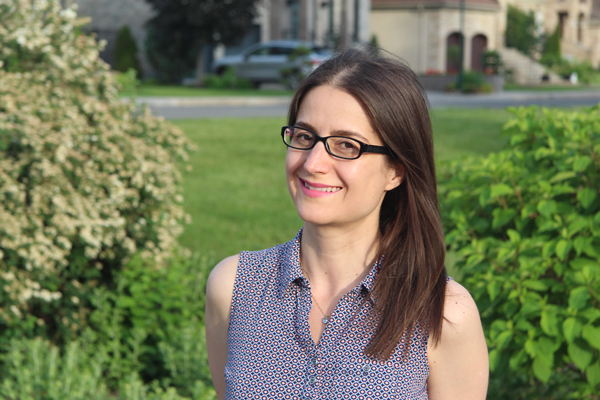
By Neale McDevitt
Rudy Zhou is a young man with a plan. Having completed his BSc Biochemistry at McGill last year, he is currently doing his MSc at Concordia. Once that part of his studies is complete, Zhou is set on pursuing a PhD. Great professors and classes aside, he says he owes much of his sense of purpose to a unique program at McGill called Summer Intensive Research Internship for Undergraduate Science Students (SIRIUSS) that gives undergraduates much-needed, hands-on lab time.
“Without my experience in the SIRIUSS program, I wouldn’t be where I am now,” he says of the four months he spent in Dr. Moshe Szyf’s lab in the summer of 2013, as a member of the first SIRIUSS cohort.
In a time when science undergraduates around the world bemoan the delay between learning the theory behind the techniques and getting to practice them, Zhou was happily investigating the DNA methylation frequency of several genes in human samples.
“SIRIUSS was my first actual research experience besides laboratory courses. It led me to understand the workload and the dedication it takes to do research, and that research is really not for everyone,” said Zhou. “It reinforced my determination to pursue a career in research since I am genuinely interested.”
Learning the ins and outs of life in a lab
The brainchild of Dr. Jane Pappas, a senior postdoctoral fellow and a research fellow researching epigenetics, SIRIUSS is a unique program that identifies highly motivated undergraduate students and teams small groups of them with post-doctoral fellows or research associates in a formal lab setting. As Dr. David Noble Harpp, Tomlinson Chair in Science Teaching put it: “Jane has set up a fine example for a mini-research unit with coherence within the unit.”
As a group, the undergraduates first learn general and specific lab techniques and then, with the help of their supervisor, choose an individualized lab project. As full-time members of the lab, each student is responsible for his or her work but they collaborate with their peers to strengthen understanding and increase their confidence.
“For the uninitiated, the lab can be a pretty intimidating place,” said Pappas. “A seemingly simple thing like not knowing where a chemical is because it is hidden in a safety cabinet can be very stressful for students just coming into a lab. This is because they need to learn everything, from the very basics, all the way to more complex issues, like how to design, perform and interpret experiments rigorously and efficiently.
Only motivated, interested and curious people need apply
SIRIUSS is open to all undergraduate science students. Selection to the program is based partially on solid academics, of course, but also on intangibles that can change from lab to lab. “We’re putting the minimum GPA at 3.4 because we need to be sure these people are rigorous in their work and have strong learning skills,” said Pappas. “But the interview is just as important, if not more so. We are looking for people who are highly motivated, interested and curious.”
“I work closely with the principal investigators because they know what kind of atmosphere their lab has and what kind of person it takes to thrive in that setting,” she said.
Ingrid Wood is one such person who, thanks to SIRIUSS, found that she thrives in the lab setting. Last summer as a U2 Pharmacology student, Wood also interned in Szyf’s lab – an experience, she said “that helped make the abstract concepts I learned in BIOL 200 concrete.”
“SIRIUSS is unique in the sense that when you first start the program you essentially get to do rotations within the lab, testing all the major techniques and finding what type of work you enjoy most,” continued Wood. “Once you get comfortable, the program is similar to ‘test driving’ a Master’s – you work full time in a lab, you regularly meet with your supervisor (the designated postdoc) to present your data, interpret your results and determine the next step in the experiments… SIRIUSS lets you find out, before committing several years, if research is truly something that interests you, and, if it does, then this experience will give you a technical advantage and greater confidence in your abilities.”
Wood’s lab experience was a good one, as she plans to apply to medical school and master’s programs in biomedicine upon finishing her undergraduate studies.
Everyone benefits
While SIRIUSS is a boon for young, would-be researchers, it benefits everyone. Post-doctoral fellows who participate get to hone their teaching, management and leadership skills – essential for any aspiring professor or principal investigator.
As well, the program serves as a scouting tool for supervisors and professors to find the best candidates for research positions. “My goal is to establish a program at McGill that nurtures future talent, closes the gap between theory and practice and increases the rate of lab productivity,” said Pappas.
“One of the secrets is to throw students into real experiments right away – there is an urgency when you know that you are handling DNA from the blood of a real patient. That feeling of contribution and the excitement it brings are part of what gives a person and lab its energy. Everyone needs to experience this excitement because that’s the kind of thing that can launch a career.”
Principal investigators and students interested in participating are invited to email Dr. Pappas at jane.pappas@mcgill.ca.
